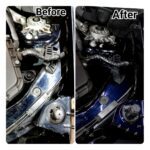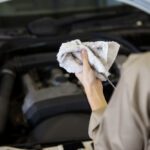
It’s essential to keep your car running at its best, and regular engine cleaning is one of the keys to keeping it in good shape. An engine gets dirty over time from oil, dirt, and other debris that can build up on its parts. Without regular engine cleaning, these contaminants can cause damage to the engine, leading to costly repairs.
In this article, we’ll discuss why it’s important to clean your engine regularly and how you can do it safely and effectively. Engine cleaning is an essential part of car maintenance that shouldn’t be overlooked. Not only does a clean engine run more efficiently, but it also helps preserve the life of your car by preventing wear and tear on its components.
When done correctly and on a regular basis, engine cleaning will help keep your car running smoothly for years to come. Let’s take a closer look at why regular engine cleaning is so important.
What Is Engine Cleaning?
Engine cleaning is the process of removing dirt, debris, and other contaminants from the engine components. This includes wiping away deposits on the engine parts, flushing the oil system and coolant system, and replacing any necessary fluids.
Regularly performing this maintenance is critical to keeping an engine running smoothly and extending its lifespan. Engine oil plays a vital role in engine performance; it helps keep all moving parts lubricated. When dirt or other contaminants build up in the oil, it can start to clog narrow passages in the engine, creating friction that can lead to damage.
Similarly, a buildup of rust or grime in a cooling system can prevent heat from dissipating correctly, causing overheating and potentially serious damage to internal parts. Regularly cleaning an engine helps keep these systems free of debris and allows them to perform optimally. It also could help identify potential issues early on so they can be addressed before they cause more severe problems.
Taking care of your vehicle by regularly cleaning its engine will pay off in both performance and longevity.
Benefits Of Regular Engine Cleaning

Regular engine cleaning has many benefits, and should not be overlooked.
For starters, it can help improve the fuel economy of a vehicle. This is achieved by removing dirt and debris that accumulates on the engine’s components, which reduces friction and increases efficiency.
Cleaning the engine also helps protect it from damaging corrosion, which can extend its life considerably.
Engine cleaning also helps to prevent oil sludge from forming, which can clog important parts of the engine and reduce its performance.
A clean engine is an efficient one, running cooler and smoother than one with heavy contamination.
Regular cleaning allows for better lubrication between the moving parts, less wear and tear on the components, and fewer repairs in the long run.
This means improved fuel economy, extended life expectancy of your vehicle’s engine, as well as increased safety while driving.
For these reasons alone, it’s highly recommended to have your engine cleaned regularly to keep it functioning properly and extend its lifespan.
Knowing how to clean your engine is essential for maintaining an efficient running car – we’ll cover this next.
How To Clean Your Engine

It’s important to remember that regular engine cleaning is essential for keeping your car running smoothly and efficiently. Now that you know the benefits of regular engine cleaning, let’s discuss how to clean your engine.
The most important factor in properly cleaning your engine is using the right technique. Use a stiff brush or an old toothbrush to scrub away any dirt and debris from nooks and crannies.
Do not use a garden hose to spray down the engine, as water can seep into sensitive electrical components and cause damage. Make sure you also use safe products like degreasers, lubricants, and cleaners specifically designed for engines.
When cleaning your engine, be sure to take extra caution when spraying on a degreaser and never leave it on for too long, as it can corrode metal surfaces over time. Also, avoid getting any liquids onto plastic parts or hoses as they may degrade with prolonged exposure.
Keep in mind that it’s best practice to disconnect the battery terminals before beginning the job as a safety precaution. With these tips in mind, you can ensure that your engine stays clean and healthy for years to come.
Up next common mistakes to avoid when cleaning your engine…
Common Mistakes To Avoid
When it comes to engine cleaning, regularity is key for keeping your vehicle running smoothly. Without regular and preventative maintenance, such as motor oil changes and engine cleaning, engines can become inefficient and require costly repairs. It’s important to take the proper steps when it comes to engine cleaning in order to avoid common mistakes and ensure that your car is running at its best.
Here are some common mistakes to avoid when cleaning an engine:
- Not researching the type of cleaner needed:
- Different types of engines require different types of cleaners, so be sure to double-check before purchasing a cleaner.
- Also make sure the cleaner you purchase is designed specifically for engines.
- Not protecting other components:
- Before starting the cleaning process, make sure all other components are covered with plastic or cloth in order to protect them from overspray or direct contact with the cleaner.
- Be sure not to leave any uncovered areas, as the cleaner could cause damage if it comes into contact with certain components.
- Applying too much pressure:
- When using a pressure washer on an engine, start with low pressure and work up gradually if necessary.
- Too much pressure can damage delicate components or cause oil leaks.
These steps will help you clean your engine safely and effectively without having to call in a professional service. By taking these precautions, you’ll be able to keep your vehicle running smoothly for years to come! With that being said, in certain cases it may be necessary to hire a professional service for more extensive engine cleaning needs.
Professional Engine Cleaning Services

Having gone over the common mistakes to avoid when cleaning an engine, it is also important to consider professional engine cleaning services.
Hiring a professional to clean your car’s engine can come with its own set of benefits. Firstly, professional services are equipped with the necessary materials and tools which can make the job much easier and more efficient than doing it yourself. It also helps save time as well as money in the long run since hiring costs for these services tend to be relatively low.
Furthermore, getting a professional service means that you can trust that your engine detailing will be cleaned properly, ensuring better protection of the engine overall. Another critical factor to consider when looking at professional cleaning services is that they use unique products and techniques designed specifically for engine cleaning.
These specialized products are not only designed to clean effectively but also protect against rust and corrosion while preserving its original condition. This ensures that your engine will stay in top condition for longer, providing you with maximum efficiency while driving. Additionally, these special products also help reduce friction between different parts of the engine, thus further enhancing its protection and performance capabilities.
At the end of the day, whether you choose to do it yourself or hire someone else for the job, regular cleanings should always be done on your car’s engine if you want it to keep running smoothly for years to come. Properly maintaining your vehicle’s engine is essential in order for it to last longer and perform optimally over time.
Investing in a reliable service provider who understands how best to take care of your vehicle’s needs will make all the difference in keeping your car safe on the road and ensuring its longevity as well as reliability down the line.
Frequently Asked Questions
How Often Should I Clean My Engine?
Preventive maintenance is key when it comes to engine cleaning, and regular cleanings can help prevent carbon buildup.
How often should you clean your engine?
Experts recommend cleaning your engine every 12 months or 12,000 miles, whichever comes first.
This frequency can depend on the type of vehicle you own as well as its driving conditions and environment.
If you live in an area with extreme weather or dirt roads, you may want to consider cleaning more frequently.
Is Engine Cleaning Necessary For All Types Of Vehicles?
Engine cleaning is necessary for all types of vehicles, as it helps to remove built up debris, sludge and dirt that can block the airways and reduce engine heat.
Without regular cleaning, fuel additives may not be able to do their job properly. This can lead to increased emissions, reduced engine performance and higher fuel consumption.
Can I Clean My Engine Myself?
Cleaning your engine yourself can be a great way to save money, but you should be aware of the risks involved.
Make sure your engine is cool before starting, as doing so when it’s still hot could cause damage.
While you can do it yourself, depending on the type of vehicle you have, it may require specialized equipment or knowledge that would be best left to an experienced professional.
Are There Any Risks Associated With Engine Cleaning?
Cleaning your engine can be beneficial, but there are risks associated with it.
Chemical safety is a major concern when it comes to engine cleaning as some chemicals can be corrosive if not handled properly.
Additionally, using the wrong motor oil or using too much motor oil during the cleaning process can result in damage to the engine.
Therefore, it’s important to understand the risks and take proper safety measures before attempting engine cleaning yourself.
What Kind Of Products Should I Use For Engine Cleaning?
It is important to consider the chemical safety of any products used for engine cleaning.
This is especially true for those who are environmentally conscious, as some products may have a negative impact on the environment.
To ensure maximum safety and minimal environmental impact, it is recommended to use biodegradable engine cleaners that contain no hazardous chemicals.
These cleaners will not only safely clean your engine but also prevent long-term pollution.
Conclusion
We’ve gone over the importance of regular engine cleaning, and now you know when and how to do it.
Cleaning your engine is a necessary maintenance step that should be taken every six months or so, depending on your vehicle type.
It’s not a difficult job and can usually be done without any help.
Just make sure you use the right products for the job and follow safety precautions to avoid any risks associated with engine cleaning.
With this knowledge, you can keep your engine running in peak condition for years to come!



